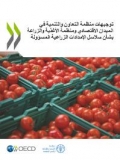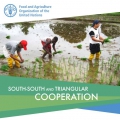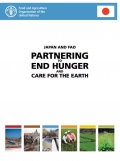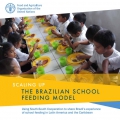وثائق

Private Sector
01 Jan 2016
وضعت منظمة الأغذية والزراعة بالتعاون مع منظمة التنمية والتعاون في الميدان الاقتصادي هذا الدليل العملي لمساعدة المشاريع على تطبيق مقاييس سلوكيات العمل المسؤول على امتداد سلاسل الإمداد الزراعي. والدليل المذكور عبارة عن موجز حول المقاييس والمبادئ الطوعية الموضوعة، والتي تشمل مبادئ الاستثمارات المسؤولة في الزراعة ونظم الأغذية التي صادقت عليها لجنة الأمن الغذائي العالمي عام 2014. ولا يقصد من هذا الدليل وضع مقاييس جديدة، أو الاستعاضة عن الموجودة منها. بل يكمن الهدف منه في مساعدة الشركات على تطبيق المقاييس الموجودة من خلال تقديم توصيات تتعلق بالخطوات التي يتعين على تلك الشركات اتباعها لتحديد الاخطار الناجمة عن التأثيرات المناوئة التي تتمخض...
Private Sector
01 Jan 2016
Corporate sustainability starts with a company’s value system and a principles-based approach to doing business. This means operating in ways that, at a minimum, meet fundamental responsibilities in the areas of human rights, labour, environment and anti-corruption. By incorporating the Ten Principles of the UN Global Compact into strategies, policies and procedures, and establishing a culture of integrity, companies are not only upholding their basic responsibilities to people and planet, but also setting the stage for long-term success.
South-south Cooperation
17 Sep 2015
There is a growing consensus around the world, affirming South-South and Triangular Cooperation as effective instruments for catalyzing agricultural development. South-South Cooperation (SSC) is widely accepted as a complementary model of development cooperation to the traditional NorthSouth model, in overcoming common challenges and achieving food security, poverty reduction and the sustainable management of natural resources.
Resource Partners
13 Jul 2015
For several decades, Japan has been among the Food and Agriculture Organization of the United Nations’ (FAO) foremost partners in feeding the hungry and caring for the earth. The country ranks second in assessed contributions to FAO’s regular budget, and fourth in terms of voluntary contributions in 2012-2013. It is also among the top contributors to the 2 500 ongoing field programmes, with a total value of nearly USD 800 million. It also provides expertise in the fields of agriculture, fisheries and forestry, contributing valuable human resources to various FAO projects.
South-south Cooperation
15 Jun 2015
Brazil has made tremendous progress in reducing malnutrition. In 1990, 14.8 percent of the population suffered from hunger; the figure is now just 1.7 percent. This remarkable transformation owes much to the country’s school feeding programme. By 2014, the programme was supplying approximately 43 million pupils with one or more servings of food per day, in almost 250 000 schools across the country. By Brazilian law, at least 30 percent of the food must be sourced from family farms, thus providing significant benefits to over 120 000 rural families. 
